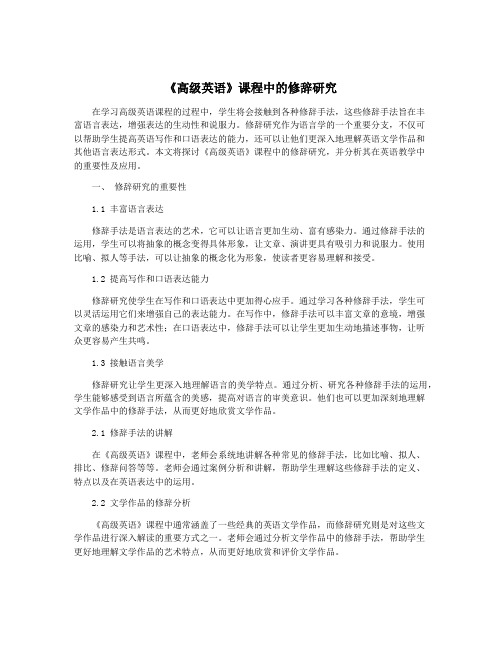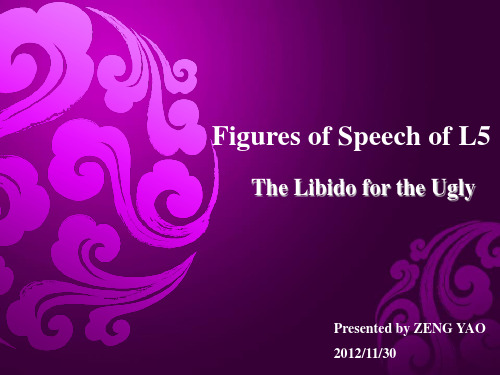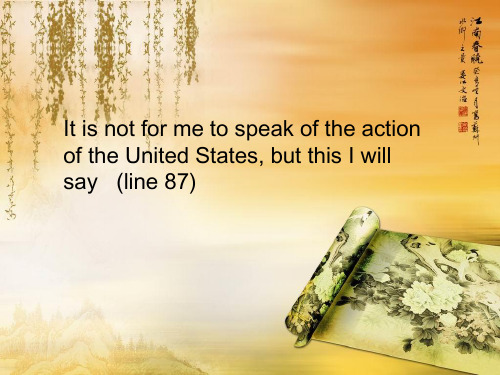高级英语第五课修辞手法分析
《高级英语》课程中的修辞研究

《高级英语》课程中的修辞研究在学习高级英语课程的过程中,学生将会接触到各种修辞手法,这些修辞手法旨在丰富语言表达,增强表达的生动性和说服力。
修辞研究作为语言学的一个重要分支,不仅可以帮助学生提高英语写作和口语表达的能力,还可以让他们更深入地理解英语文学作品和其他语言表达形式。
本文将探讨《高级英语》课程中的修辞研究,并分析其在英语教学中的重要性及应用。
一、修辞研究的重要性1.1 丰富语言表达修辞手法是语言表达的艺术,它可以让语言更加生动、富有感染力。
通过修辞手法的运用,学生可以将抽象的概念变得具体形象,让文章、演讲更具有吸引力和说服力。
使用比喻、拟人等手法,可以让抽象的概念化为形象,使读者更容易理解和接受。
1.2 提高写作和口语表达能力修辞研究使学生在写作和口语表达中更加得心应手。
通过学习各种修辞手法,学生可以灵活运用它们来增强自己的表达能力。
在写作中,修辞手法可以丰富文章的意境,增强文章的感染力和艺术性;在口语表达中,修辞手法可以让学生更加生动地描述事物,让听众更容易产生共鸣。
1.3 接触语言美学修辞研究让学生更深入地理解语言的美学特点。
通过分析、研究各种修辞手法的运用,学生能够感受到语言所蕴含的美感,提高对语言的审美意识。
他们也可以更加深刻地理解文学作品中的修辞手法,从而更好地欣赏文学作品。
2.1 修辞手法的讲解在《高级英语》课程中,老师会系统地讲解各种常见的修辞手法,比如比喻、拟人、排比、修辞问答等等。
老师会通过案例分析和讲解,帮助学生理解这些修辞手法的定义、特点以及在英语表达中的运用。
2.2 文学作品的修辞分析《高级英语》课程中通常涵盖了一些经典的英语文学作品,而修辞研究则是对这些文学作品进行深入解读的重要方式之一。
老师会通过分析文学作品中的修辞手法,帮助学生更好地理解文学作品的艺术特点,从而更好地欣赏和评价文学作品。
在《高级英语》课程中,学生需要进行大量的写作和口语练习。
而修辞研究则为学生提供了丰富的表达方式,帮助他们在写作和口语表达中灵活运用各种修辞手法,从而提高表达的艺术性和有效性。
《高级英语》课程中的修辞研究

《高级英语》课程中的修辞研究修辞是文学创作和语言表达中广泛运用的技巧和手段,旨在让语言更加富有感染力和表现力。
《高级英语》课程中的修辞研究主要包括四个方面的内容:修辞手法、修辞分析、修辞批评和修辞应用。
一、修辞手法修辞手法是修辞学研究的核心内容,也是学生必须掌握的基本技巧。
其中,最常用的修辞手法包括比喻、拟人、夸张、反语、排比等。
1.比喻:比喻是将两个本来没有任何关系的事物进行类比,以便更好地说明一个概念或情感。
比喻可以使语言更加形象、生动,让读者更容易理解和接受作者的观点。
2.拟人:拟人是将非人物化的事物赋予人的特征和行为,让读者觉得它们像人一样具有思维、感情和行动能力。
拟人可以让文本更加感人、有趣,让读者更加易于产生共鸣。
3.夸张:夸张是用过度强调或夸大的手法来表达某种情感或强调某个观点。
夸张可以让语言更有张力和感染力,让读者更加注意到作者的意图。
4.反语:反语是用相反的话来表达自己的意图,通常用于表达讽刺、讥笑、批评等意味。
反语可以使语言更加幽默、深刻,让读者更加有舒适感和启迪性。
5.排比:排比是用类似的结构和构造来重复表达一种思想或情感。
排比可以使语言更加流畅、有韵律,让读者更加容易记住和理解作者的意图。
二、修辞分析修辞分析是对文本中所使用的修辞手法进行细致分析和解释。
对于高级英语学生来说,掌握分析修辞的技能至关重要。
在修辞分析中,学生需要关注以下几个方面:1.修辞手法的类型和目的:学生需要明确修辞手法是哪种类型、用于什么目的。
2.修辞手法的具体表现:学生需要找出文本中哪些地方使用了该修辞手法。
3.修辞手法的效果:学生需要说明修辞手法的使用会带来什么效果,比如增强感染力、产生幽默效果、强化情感表达等等。
三、修辞批评修辞批评是对文本中所使用的修辞手法进行批评和评价。
在进行修辞批评时,学生需要注意以下几个方面:1.修辞手法是否恰当:学生需要评估该修辞手法是否适合用于该文本的情境,是否符合文本的语气、风格和主题。
高级英语Lesson5修辞The Libido for the Ugly

Theme: The innate love of ugliness in US is a pathological(病态的) problem. dreadful, hideous, bleak, appalling,
forlorn, revolting, macabre, monstrousness, leprous, misshapen, dingy, loathsome, obscene, putrid, ghastly, leprous, uremic, eczematous
Inversion
Parallelism
repetition
transferred epithet
Synecdoche 提喻 Rhetorical question
Speech Contents
Hyperbole in L5
superlative
(Para 1) “the boast and pride of the richest and grandest nation ever seen on earth” (Para 1) “Here was wealth ….disgraced a race of ally cats.(流浪猫)”
Emphasizing
Definition of Hyperbole :
A deliberate use of overstatement or exaggeration to achieve emphasis.
Hyperbole in L5:
They amplify both prosperity and ugliness of Westmoreland, which provoke the curiosity and imagination of readers.
《高级英语》教材中的修辞格赏析

《高级英语》教材中的修辞格赏析作者:孔敏来源:《校园英语·中旬》2017年第01期【摘要】英语修辞越来越多的为人们所应用于报纸,广播,杂志,文学作品以及日常生活中。
本文拟从《高级英语》教材中的一些修辞手法入手,从英语意象方面进行分析、赏欣,使读者认识到英语修辞在语言表达中的重要作用。
【关键词】修辞修辞格赏析修辞(rhetoric)就是在应用语言的时候,根据特定的目的,精心的选择语言的过程。
运用各种语言文字材料,各种表现手法,来恰当地表达思想和感情,力求把话说得更正确、明白,使文章更加的生动、精彩。
修辞格(figures of speech)是在修饰语言的过程中,形成的具有独特的表达效果的比较固定的格式,也称修辞手段,修辞方式等。
恰当的使用修辞格,可以使语言生动形象,意蕴优美,更具说服力和感染力。
现从英语意象方面就《高级英语》教材中的修辞格进行发掘和赏欣。
1.明喻(simile)。
(1) I see also the dull, drilled, docile, brutish masses of the Hun soldiery plodding on like a swarm of crawling locusts. (Speech on Hitler’s Invasion of the U.S.S.R.)(2) The wind (Hurricane Camile) sounded like the roar of a train passing a few yards away. (Face to Face with Hurricane Camile)句(1)摘自于英国首相丘吉尔《关于希特勒入侵苏联的讲话》。
这位强悍的英国首相把德国凶残,野蛮的士兵比作成群结队,且对农作物可以造成灭顶之灾的蝗虫。
因为两者有着共同的特点——制造毁灭,深刻的揭露并批判了德国法西斯的凶残。
句(2)中作者把卡米尔号飓风的声响(the sound of the wind)比作在身边呼啸而过的列车发出的响声(the roar of a passing train),非常的贴切、生动、形象。
高级英语第五课修辞手法分析

高级英语第五课修辞手法分析预览说明:预览图片所展示的格式为文档的源格式展示,下载源文件没有水印,内容可编辑和复制1. Irony(反讽) is the use of words that the opposite of what you really mean, often as a joke and with a tone of voice that shows this.(1)I award this champion only after laborious research and incessant prayer. (L.1, Para.5)(2)It is as if some titanic and aberrant genius, uncompromisingly inimical to man, had devotedall the ingenuity of Hell to the making of them. (L.14, Para.5)(3)It is incredible that mere ignorance should have achieved such masterpieces of horror.(L.11,Para.6)2. Sarcasm(讽刺) is a way of using words that are the opposite of what you mean in order to be unpleasant to somebody or to make fun of them.(1) Obviously, if there were architects of any professional sense or dignity in the region, they would have perfected a chalet to hug the hillsides… (L.6, Para.3)(2) They are incomparable in color, and they are incomparable in design. (L.13, Para.5)3. Ridicule(嘲讽) refers to unkind comments that make fun of somebody/something or make them look silly.(1) When it has taken on the patina of the mills it is the color of an egg long past all hope or caring. (L.2, Para.4)(2) They made it perfect in their own sight by putting a completely impossible penthouse, painteda staring yellow, on top of it. (L.15, Para.8)4. Understatement(低调陈述) is the opposite of hyperbole. It achieves its effect of emphasizing a fact by deliberately understating it, impressing the listeners or the readers more by what is merely implied or left unsaid than by bare statement.(1) The country itself is not uncomely, despite the grime of the endless mills. (L.1, Para.3)5. Antonomasia(换称) is a figure of speech that involves the use of epithet or title in place of a name, and also the use of a proper name in place of a common noun.(1) Safe in a Pullman, I have whirled through the gloomy, God-forsaken villages of Iowa and Kansas, and the malarious tidewater hamlets of Georgia. (L.7, Para5)6. Antithetical Contrast(反衬对比) is a figure of speech combined by antithesis and contrast, and often has two sharply contrasting ideas balanced across a sentence (or neighboring sentences) (1) Here was the very heart of industrial America, the center of its most lucrative and characteristic activity, the boast and pride of the richest and grandest nation ever seen on earth—and here was a sense so dreadfully hideous, so intolerably bleak and forlorn that it reduced the whole aspiration of man to a macabre and depressing joke. (L.5, Para.1)(2) Here was wealth beyond computation, almost beyond imagination—and here were habitations so abominable that they would have disgraced a race of alley cats. (L.10, Para1)7. Hyperbole(夸张) is a way of speaking or writing that makes something should be better, more exciting, dangerous, etc. than it really is.(1) What I allude to is the unbroken and agonizing ugliness, the sheer revolting monstrousness, of every house in sight. (L.2,Para.2)(2) From East Liberty to Greensburg, a distance of twenty-five miles, there was not one in sight from the train that did not insult and lacerate the eye. (L.3, Para.2)(3) But in Westmoreland they prefer that uremic yellow, and so they have the most loathsome towns and villages ever seen by mortal eye. (L.8, Para.4)(4) I have seen, I believe, all of the most unlovely towns of the world; they are all to be found in the United States. (L.2, Para.5)(5) It is as if some titanic and aberrant genius, uncompromisingly inimical to man, had devoted all the ingenuity of Hell to the making of them. (L.14, Para.5)8. Metaphor(暗喻) is a figure of speech that describes something by referring to it as something else, in order to show that the two things have the same qualities and to make the description more powerful.(1) Here was the very heart of industrial America… (L.5, Para.1)(2)…on their low sides they bury themselves swinishly in the mud. ((L.17, Para. 3)(3) And one and all they are streaked in grime, with dead and eczematous patches of paint peeping through the streaks. (L.20, Para.3)(4) The effect is that of a fat woman with a black eye. It is that of a Presbyterian grinning. (L.17, Para.8)(5) Out of the melting pot emerges a race which hates beauty as it hates truth. (L.3, Para.9)9. Simile(明喻) is a figure of speech that often uses the words like or as, etc. to make a comparison between to unlike elements having at least one quality or characteristic in common.(1) …one blinked before them as one blinks before a man with face shot away. (L.7, Para.2)(2) …a crazy little church just west of Jeannette, set like a dormer window on the side of a bare leprous hill… (L.9, Para.2)(3) …a steel stadium like a huge rat-trap somewhere further down the line. (L.12, Para.2)10. Rhetorical Question(修辞疑问句) is a figure of speech in the form of a question posed for its persuasive effect without the expectation of a reply. Rhetorical question encourages the listener to think about what the answer (often obvious) to the question might be.(1) But what have they done? (L.11, Para.3)(2) Was it necessary to adopt that shocking color? (L.4, Para.4)(3) Are they so frightful because the valley is full of foreigners—dull, intense brutes, with no love of beauty in them? (L.1, Para.6)(4) Then why did not these foreigners set up similar abominations in the countries that they came from? (L.2, Para.6)。
高级英语第五课修辞

5/2/2014
Before long the movement had become officially recognized by the pulpit…implied promise that their owners would be rendered sexually irresistible. (para.8)
此处使用了暗喻的修辞,将年轻人的狂野行为和 自我放纵比作短暂的狂欢,将逃避者比作醉酒的 狂欢者。
5/2/2014
Greenwich village set the pattern.(para.7)
metonymy 转喻 Many writers and artists came to live in Greenwich village, and many other young intellectuals followed their footsteps.
5/2/2014
添
But at the same time it was tempted, in America at least, to escape its responsibilities and retreat behind an air of naughty alcoholic sophistication and a pose of bohemian immorality.(para.4) Transferred epithet 形容词naughty和alcoholic在此处的使用属于 移位修饰,真正地被修饰语是youth,指年轻 人没有规矩,酗酒成瘾。
击 添
…we had reached an international stature that would forever prevent us from retreating behind the artificial walls of a provincial morality or the geographical protection of our two bordering oceans.(para.2)
高英第5课11,12,13段修辞

personification
This is no time to moralise on the follies of countries and Governments which have allowed themselves to be stuck down one by one (line94)
...by which he has so long thrived and prospered, and then the scene will be clear for final act, without... (line110)
...by which he has so long thrived and prospered, and then the scene will be clear for final act, without... (line110)
concise in language(语言简洁), balanced in structure, forceful in tone, and distinguished in significane (烘托意义)
Let us learn the lessons already taught by such cruel experience. Let us redouble our exertions, and strike with united strength while life and power remain. (line117) learn lesson [lɜːn] ['les(ə)n]
periodic sentence 掉尾句
if Hitler imagines that ……, he is woefully mistaken. (line 88)
高级英语第五课修辞

添 加 文 本
And like most escapist sprees, this one lasted until the money ran out, until the crash of the world economic structure at the end of the decade called the party to a halt and forced the revelers to sober up and face the problems of the new age.(para.4) metaphor
5/2/2014
Before long the movement had become officially recognized by the pulpit…implied promise that their owners would be rendered sexually irresistible. (para.8)
5/2/2014
pens象征年轻作家们的作品,而Babbitt try 指的是美国小说《巴比特》中主人公的特征 。
5/2/2014
As it become more and more fashionable throughout the country for young persons to defy the law and the conflagration of “flaming youth”, it was Greenwich village that fanned the flames.(para.8) metaphor 此处运用了暗喻,分别将年轻人的反叛和种种叛 逆行为比作了一场大火和助燃的小火柴。
此处运用了暗喻,将《美国的文明》一书比作 聚集点。
- 1、下载文档前请自行甄别文档内容的完整性,平台不提供额外的编辑、内容补充、找答案等附加服务。
- 2、"仅部分预览"的文档,不可在线预览部分如存在完整性等问题,可反馈申请退款(可完整预览的文档不适用该条件!)。
- 3、如文档侵犯您的权益,请联系客服反馈,我们会尽快为您处理(人工客服工作时间:9:00-18:30)。
1. Irony(反讽) is the use of words that the opposite of what you really mean, often as a joke and with a tone of voice that shows this.(1)I award this champion only after laborious research and incessant prayer. (L.1, Para.5)(2)It is as if some titanic and aberrant genius, uncompromisingly inimical to man, had devotedall the ingenuity of Hell to the making of them. (L.14, Para.5)(3)It is incredible that mere ignorance should have achieved such masterpieces of horror.(L.11,Para.6)2. Sarcasm(讽刺) is a way of using words that are the opposite of what you mean in order to be unpleasant to somebody or to make fun of them.(1) Obviously, if there were architects of any professional sense or dignity in the region, they would have perfected a chalet to hug the hillsides… (L.6, Para.3)(2) They are incomparable in color, and they are incomparable in design. (L.13, Para.5)3. Ridicule(嘲讽) refers to unkind comments that make fun of somebody/something or make them look silly.(1) When it has taken on the patina of the mills it is the color of an egg long past all hope or caring. (L.2, Para.4)(2) They made it perfect in their own sight by putting a completely impossible penthouse, painteda staring yellow, on top of it. (L.15, Para.8)4. Understatement(低调陈述) is the opposite of hyperbole. It achieves its effect of emphasizing a fact by deliberately understating it, impressing the listeners or the readers more by what is merely implied or left unsaid than by bare statement.(1) The country itself is not uncomely, despite the grime of the endless mills. (L.1, Para.3)5. Antonomasia(换称) is a figure of speech that involves the use of epithet or title in place of a name, and also the use of a proper name in place of a common noun.(1) Safe in a Pullman, I have whirled through the gloomy, God-forsaken villages of Iowa and Kansas, and the malarious tidewater hamlets of Georgia. (L.7, Para5)6. Antithetical Contrast(反衬对比) is a figure of speech combined by antithesis and contrast, and often has two sharply contrasting ideas balanced across a sentence (or neighboring sentences) (1) Here was the very heart of industrial America, the center of its most lucrative and characteristic activity, the boast and pride of the richest and grandest nation ever seen on earth—and here was a sense so dreadfully hideous, so intolerably bleak and forlorn that it reduced the whole aspiration of man to a macabre and depressing joke. (L.5, Para.1)(2) Here was wealth beyond computation, almost beyond imagination—and here were habitations so abominable that they would have disgraced a race of alley cats. (L.10, Para1)7. Hyperbole(夸张) is a way of speaking or writing that makes something should be better, more exciting, dangerous, etc. than it really is.(1) What I allude to is the unbroken and agonizing ugliness, the sheer revolting monstrousness, of every house in sight. (L.2, Para.2)(2) From East Liberty to Greensburg, a distance of twenty-five miles, there was not one in sight from the train that did not insult and lacerate the eye. (L.3, Para.2)(3) But in Westmoreland they prefer that uremic yellow, and so they have the most loathsome towns and villages ever seen by mortal eye. (L.8, Para.4)(4) I have seen, I believe, all of the most unlovely towns of the world; they are all to be found in the United States. (L.2, Para.5)(5) It is as if some titanic and aberrant genius, uncompromisingly inimical to man, had devoted all the ingenuity of Hell to the making of them. (L.14, Para.5)8. Metaphor(暗喻) is a figure of speech that describes something by referring to it as something else, in order to show that the two things have the same qualities and to make the description more powerful.(1) Here was the very heart of industrial America… (L.5, Para.1)(2)…on their low sides they bury themselves swinishly in the mud. ((L.17, Para. 3)(3) And one and all they are streaked in grime, with dead and eczematous patches of paint peeping through the streaks. (L.20, Para.3)(4) The effect is that of a fat woman with a black eye. It is that of a Presbyterian grinning. (L.17, Para.8)(5) Out of the melting pot emerges a race which hates beauty as it hates truth. (L.3, Para.9)9. Simile(明喻) is a figure of speech that often uses the words like or as, etc. to make a comparison between to unlike elements having at least one quality or characteristic in common.(1) …one blinked before them as one blinks before a man with face shot away. (L.7, Para.2)(2) …a crazy little church just west of Jeannette, set like a dormer window on the side of a bare leprous hill… (L.9, Para.2)(3) …a steel stadium like a huge rat-trap somewhere further down the line. (L.12, Para.2)10. Rhetorical Question(修辞疑问句) is a figure of speech in the form of a question posed for its persuasive effect without the expectation of a reply. Rhetorical question encourages the listener to think about what the answer (often obvious) to the question might be.(1) But what have they done? (L.11, Para.3)(2) Was it necessary to adopt that shocking color? (L.4, Para.4)(3) Are they so frightful because the valley is full of foreigners—dull, intense brutes, with no love of beauty in them? (L.1, Para.6)(4) Then why did not these foreigners set up similar abominations in the countries that they came from? (L.2, Para.6)。
